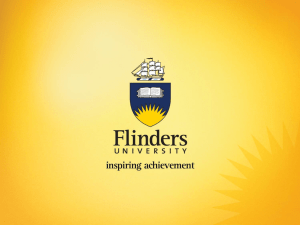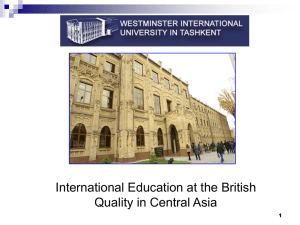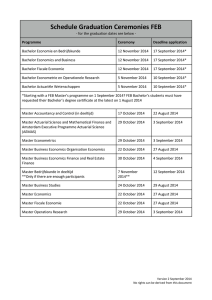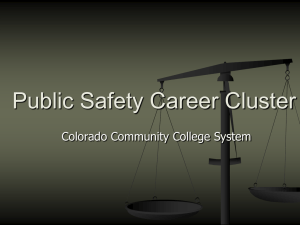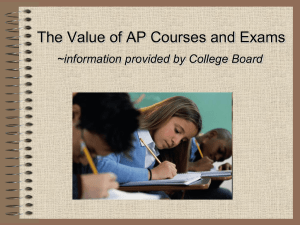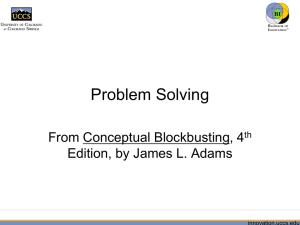Guidelines on Child Protection Qualifications
advertisement
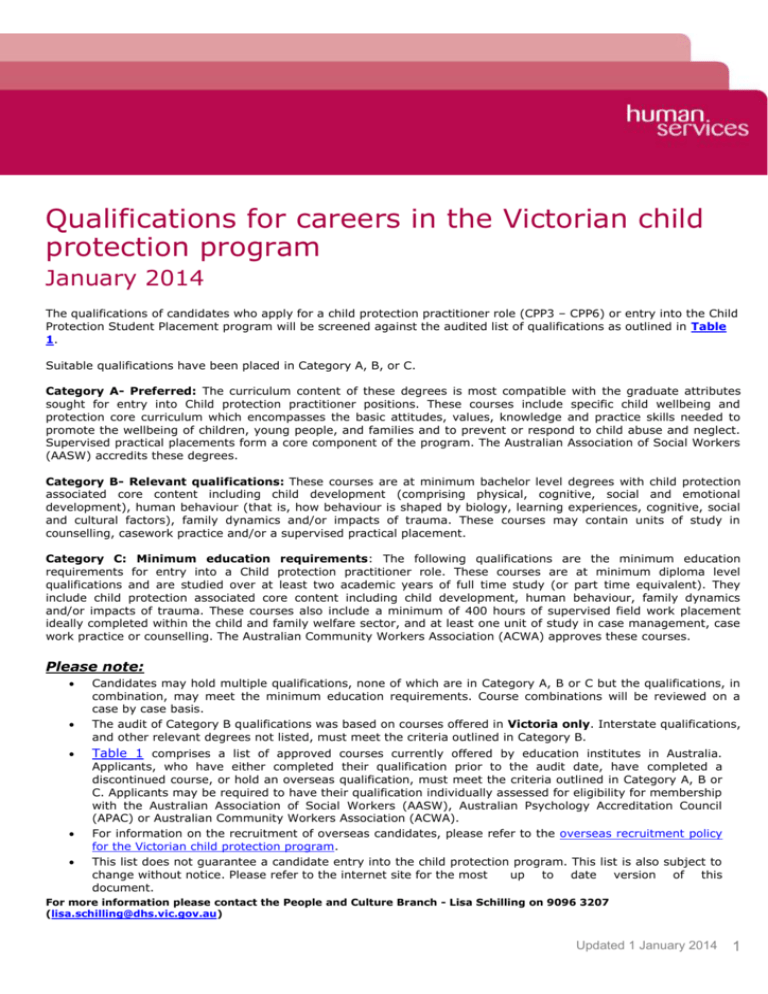
Qualifications for careers in the Victorian child protection program January 2014 The qualifications of candidates who apply for a child protection practitioner role (CPP3 – CPP6) or entry into the Child Protection Student Placement program will be screened against the audited list of qualifications as outlined in Table 1. Suitable qualifications have been placed in Category A, B, or C. Category A- Preferred: The curriculum content of these degrees is most compatible with the graduate attributes sought for entry into Child protection practitioner positions. These courses include specific child wellbeing and protection core curriculum which encompasses the basic attitudes, values, knowledge and practice skills needed to promote the wellbeing of children, young people, and families and to prevent or respond to child abuse and neglect. Supervised practical placements form a core component of the program. The Australian Association of Social Workers (AASW) accredits these degrees. Category B- Relevant qualifications: These courses are at minimum bachelor level degrees with child protection associated core content including child development (comprising physical, cognitive, social and emotional development), human behaviour (that is, how behaviour is shaped by biology, learning experiences, cognitive, social and cultural factors), family dynamics and/or impacts of trauma. These courses may contain units of study in counselling, casework practice and/or a supervised practical placement. Category C: Minimum education requirements: The following qualifications are the minimum education requirements for entry into a Child protection practitioner role. These courses are at minimum diploma level qualifications and are studied over at least two academic years of full time study (or part time equivalent). They include child protection associated core content including child development, human behaviour, family dynamics and/or impacts of trauma. These courses also include a minimum of 400 hours of supervised field work placement ideally completed within the child and family welfare sector, and at least one unit of study in case management, case work practice or counselling. The Australian Community Workers Association (ACWA) approves these courses. Please note: Candidates may hold multiple qualifications, none of which are in Category A, B or C but the qualifications, in combination, may meet the minimum education requirements. Course combinations will be reviewed on a case by case basis. The audit of Category B qualifications was based on courses offered in Victoria only. Interstate qualifications, and other relevant degrees not listed, must meet the criteria outlined in Category B. Table 1 comprises a list of approved courses currently offered by education institutes in Australia. Applicants, who have either completed their qualification prior to the audit date, have completed a discontinued course, or hold an overseas qualification, must meet the criteria outlined in Category A, B or C. Applicants may be required to have their qualification individually assessed for eligibility for membership with the Australian Association of Social Workers (AASW), Australian Psychology Accreditation Council (APAC) or Australian Community Workers Association (ACWA). For information on the recruitment of overseas candidates, please refer to the overseas recruitment policy for the Victorian child protection program. This list does not guarantee a candidate entry into the child protection program. This list is also subject to change without notice. Please refer to the internet site for the most up to date version of this document. For more information please contact the People and Culture Branch - Lisa Schilling on 9096 3207 (lisa.schilling@dhs.vic.gov.au) Updated 1 January 2014 1 Table 1: Qualifications for careers in the Victorian child protection program –January 2014 Next formal audit date: January 2015 Category A- Preferred VICTORIA Education Provider Title Deakin University Bachelor of Social Work Bachelor of Social Work (Honours) Master of Social Work (Qualifying) La Trobe University Bachelor of Human Services and Master of Social Work Master of Social Work (Qualifying) Monash University Bachelor of Arts/ Bachelor of Social Work Bachelor of Arts/ Bachelor of Social Work (Honours) Bachelor of Health Science/Bachelor of Social Work Bachelor of Health Science/Bachelor of Social Work (Honours) Bachelor of Social Work Bachelor of Social Work (Honours) Master of Social Work (Qualifying) Royal Melbourne Institute of Technology Bachelor of Social Work Bachelor of Social Science (Psychology)/Bachelor of Social Work Master of Social Work (Qualifying) The University of Melbourne Master of Social Work (Qualifying) Victoria University of Technology Bachelor of Social Work NEW SOUTH WALES & AUSTRALIAN CAPITAL TERRITORY Education Provider Title Australian Catholic University Bachelor of Social Work Bachelor of Social Work (Honours) Bachelor of Theology/ Bachelor of Social Work, Bachelor of Arts/ Bachelor of Social Work Bachelor of Arts (ANU)/ Bachelor of Social Work Master of Social Work (Qualifying) Charles Sturt University Bachelor of Social Work Bachelor of Arts/Bachelor of Social Work Bachelor of Arts/Bachelor of Social Work (Honours) Master of Social Work (Qualifying) University of New England Bachelor of Social Work Master of Social Work (Qualifying) University of New South Wales Bachelor Bachelor Bachelor Bachelor University of Newcastle Bachelor of Social Work of of of of Social Social Social Social Work Work/Bachelor of Laws Work/Bachelor of Arts Work/Bachelor of Social Science Updated 1 January 2014 2 Category A- Preferred University of Sydney Bachelor of Social Work Bachelor of Arts/Bachelor of Social Work Master of Social Work (Qualifying) University of Western Sydney Bachelor of Social Work SOUTH AUSTRALIA Flinders University of South Australia Bachelor of Social Work and Social Planning Master of Social Work (Qualifying) University of South Australia Bachelor of Social Work Bachelor of Arts/Bachelor of Social Work Bachelor of Arts (International Studies)/Bachelor of Social Work Bachelor of Arts (Aboriginal Studies)/Bachelor of Social Work Master of Social Work (Qualifying) TASMANIA University of Tasmania Bachelor of Social Work Bachelor of Social Work (Honours) Master of Social Work (Qualifying) QUEENSLAND Australian Catholic University Bachelor of Social Work Bachelor of Theology/Bachelor of Social Work Bachelor of Arts/Bachelor of Social Work Master of Social Work (Qualifying) Central Queensland University Bachelor of Social Work Griffith University Bachelor of Social Work Master of Social Work (Qualifying) James Cook University Bachelor of Social Work Bachelor of Arts/Bachelor of Social Work Master of Social Work (Qualifying) Queensland University of Technology Bachelor of Social Work Bachelor of Behavioural Science (Psychology)/Bachelor of Social Work Master of Social Work (Qualifying) Southern Cross University Master of Social Work (Qualifying) University of Queensland Bachelor of Social Work Bachelor of Social Work/Bachelor of Arts Bachelor of Social Work/Bachelor of Social Science Master of Social Work Studies University of Sunshine Coast Bachelor of Social Work Master of Social Work (Qualifying) WESTERN AUSTRALIA Curtin University of Technology Bachelor of Social Work Edith Cowan University Bachelor of Social Work Bachelor of Social Work (Honours) University of Western Australia Bachelor of Social Work Master of Social Work (Qualifying) NORTHERN TERRITORY Charles Darwin University Bachelor of Social Work Note: Social Work degrees must be accredited by the Australian Association of Social Workers (AASW). Please refer to www.aasw.asn.au for a list of previously approved courses. Updated 1 January 2014 3 Category B- Relevant VICTORIA Education Provider Title Australian Institute of Professional Counsellors (AIPC) Australian College of Applied Psychology Bachelor of Counselling Australian Catholic University Deakin University Federation University (previously known as University of Ballarat and Monash University, Churchill campus) La Trobe University Monash University Bachelor of Applied Social Science (Counselling) Bachelor of Psychological Science Graduate Diploma of Psychological Science Bachelor of Psychological Science (Honours) Graduate Diploma of Psychology Bachelor of Arts (Psychology) Bachelor of Psychological Science Bachelor of Social Science (Psychology) Bachelor of Social Science (Behavioural Science) Bachelor of Psychological Science (Honours) Bachelor of Youth Work Graduate Diploma in Psychology (for graduates of other disciplines) Postgraduate Diploma in Psychology Master of Clinical Counselling Master of Psychology (Clinical) Master in Psychology (Educational and Developmental) Bachelor of Applied Science (Psychology) Bachelor of Applied Science (Psychology) (Honours) Bachelor of Arts– major: Psychology* Bachelor of Arts (Psychology) (Honours) Bachelor of Health Sciences– majors: Psychology*, Family, Society and Health Bachelor of Psychology Bachelor of Science– major: Psychology* Bachelor of Science (Psychology) (Honours) Graduate Diploma of Psychological Studies (for graduates of other disciplines) Graduate Diploma of Psychology Master of Psychology (Clinical) Bachelor of Arts– majors: Psychology* Bachelor of Arts (Psychology) (Honours) Bachelor of Arts (Rural Social Welfare) Bachelor of Community Welfare and Counselling Bachelor of Psychological Science Graduate Diploma in Psychology Graduate Diploma in Rural Social Welfare Postgraduate Diploma in Psychology Master of Psychology (Clinical) Bachelor of Behavioural Science (Psychology) Bachelor of Laws/Bachelor of Psychological Science Bachelor of Psychological Science Bachelor of Psychological Science (Honours) Postgraduate Diploma in Psychology Master of Clinical Neuropsychology Master of Clinical Psychology Master of Counselling Psychology Bachelor of Arts– major: Psychology*, Psychological studies Bachelor of Arts (with Honours)– major: Psychology* Bachelor of Arts (Psychology) Bachelor of Behavioural Neuroscience- majors: Psychology Bachelor of Behavioural Neuroscience (with Honours) (Psychology) Bachelor of Behavioural Science– major: Psychology* Bachelor of Business (Psychology) Bachelor of Nursing (Psychological Science) Bachelor of Psychological Science Bachelor of Psychological Science and Business Bachelor of Psychological Science and Business (Honours) Bachelor of Psychology (with Honours) Bachelor of Science– majors: Psychology* Bachelor of Science (with Honours) – major: Psychology* Updated 1 January 2014 4 Swinburne University of Technology Tabor College Victoria The University of Melbourne RMIT Victoria University Bachelor of Social Welfare Master of Social Work (Forensic Studies) Graduate Diploma of Psychology (for graduates of other disciplines) Diploma of Psychology (undertaken concurrently with another degree) Postgraduate Diploma in Psychology Master of Child Psychoanalytic Psychotherapy Master of Psychology (Counselling) Master of Psychology (Educational and Developmental) Bachelor of Arts – major: Psychology* Bachelor of Arts (Psychology) Bachelor of Arts (Psychology and Forensic Science) Bachelor of Arts (Psychology and Sport Science) Bachelor of Arts (Honours)– major: Psychology* Bachelor of Arts (Psychology and Psychophysiology) Bachelor of Behavioural Studies (Psychology) Bachelor of Business– major: Psychology* Bachelor of Community Health Bachelor of Science– major: Psychology* Bachelor of Science (Psychology) Bachelor of Science (Psychology and Psychophysiology) Bachelor of Social Science– major: Psychology* Bachelor of Social Science (Psychology) Graduate Diploma of Psychology (for graduates of other disciplines) Graduate Diploma of Social Science (Psychological Studies) Postgraduate Diploma of Psychology Master of Psychology (Counselling Psychology) Master of Psychology (Clinical Psychology) Master of Social Science (Human Services- Counselling) Bachelor of Arts- major: Psychology Bachelor of Arts (Counselling) Bachelor of Arts (Youth Work) Bachelor of Arts– major: Psychology* Bachelor of Arts (Honours)– major: Psychology* Bachelor of Commerce– major: Psychology* Bachelor of Science– major: Psychology* Bachelor of Science (Honours)– major: Psychology* Graduate Diploma in Psychology Postgraduate Diploma in Psychology Master of Educational Psychology Master of Psychology (Clinical) Master of Psychology (Clinical Neuropsychology) Bachelor of Arts (Criminology and Psychology) Bachelor of Applied Science (Psychology) Bachelor of Applied Science (Psychology) (Honours) Bachelor of Social Science (Psychology) Graduate Diploma in Behavioural Science (for graduates of other disciplines) Graduate Diploma in Psychology Master of Psychology (Clinical) Master of Psychology (Educational and Developmental) Bachelor of Social Science (Youth Work) Bachelor of Arts– major: Psychology* Bachelor of Arts (Honours) (Psychology) Bachelor of Arts (Youth Studies) Bachelor of Youth Work Bachelor of Psychological Studies Bachelor of Psychological Studies (Honours) Bachelor of Science (Psychology) Bachelor of Science (Honours) Psychology Graduate Diploma in Psychological Studies Graduate Diploma in Psychology Master of Applied Psychology (Community Psychology) Master of Applied Psychology (Clinical Psychology) Refers to majors that are accredited by the Australian Psychology Accreditation Council (APAC). Non-APAC accredited psychology majors may or may not cover all criteria in category B. This is dependant on the electives completed by the candidate. It is recommended that the Workforce Development unit review the candidate’s academic transcript to determine whether units within the course reflect the criteria outlined in Category B. Updated 1 January 2014 5 Category C- Minimum VICTORIA Education Provider Title Advance TAFE (formerly East Gippsland TAFE) Diploma of Community Services Work Academies Australasia Polytechnic (formerly Ami Education Pty Ltd RTO Diploma of Community Services Work Australian Institute of Technical Training RTO Diploma of Community Services Work Carrick Education Diploma of Community Services Work Chisholm Institute of TAFE Diploma of Community Services Work Federation University (previously known as Ballarat University and Monash University, Churchill campus) Associate Degree in Community Welfare and Counselling Diploma of Community Services Work Goulburn Ovens Institute of TAFE Diploma of Community Services Work Holmesglen TAFE Diploma of Community Services Work Institute of Tertiary and Higher Education Australia (ITHEA) Diploma of Community Services Work Kangan Institute of TAFE Diploma of Community Services Work Mansfield Adult Continuing Education Inc. (MACE) Diploma of Community Services Work Northern Melbourne Institute of TAFE Diploma of Community Services Work Stott’s College Diploma of Community Services Work Sunraysia TAFE Diploma of Community Services Work Swinburne University of Technology Diploma of Community Services Work The Gordon Diploma of Community Services Work Wodonga Institute of TAFE Diploma of Community Services Work Victoria University Diploma of Community Services Work South West Institute of TAFE Diploma of Community Services Work Bendigo Regional Institute of TAFE Diploma of Community Services Work NEW SOUTH WALES & AUSTRALIAN CAPITAL TERRITORY Education Provider Title Nirimba College (formerly Western Sydney TAFE)- Quakers Hill campus Diploma of Community Services Work South Western Sydney Institute of TAFEGranville campus Diploma of Community Services Work TAFE NSW (Sydney Institute, Sutherland College) Diploma of Community Services Work SOUTH AUSTRALIA Education Provider Title TAFE SA North – Port Adelaide Diploma of Community Services Work TASMANIA Updated 1 January 2014 6 Category C- Minimum Education Provider Title NIL QUEENSLAND Education Provider Title Brisbane North Institute of TAFE- Brackenridge and Caboolture campuses Diploma of Community Services Work Lifetime International Training CollegeCoolangatta/Southport campuses Diploma of Community Services Work Metropolitan South Institute of TAFE Diploma of Community Services Work Southbank Institute of TAFE- South Brisbane campus Diploma of Community Services Work WESTERN AUSTRALIA Education Provider Title Central Institute of Technology- Leederville campus Diploma of Community Services Work Challenger Institute of Technology- Beaconsfield and Mandurah campuses Diploma of Community Services Work NORTHERN TERRITORY Education Provider Title NIL Note: Diplomas must be approved by the Australian Community Workers Association (ACWA) Please refer to www.acwa.org.au for a list of previously approved courses. Updated 1 January 2014 7 Frequently Asked Questions 1. What was the purpose of the audit? 2. What were the criteria for the audit? 3. How was the audit completed? 4. What were the findings of the audit? 5. Why is my qualification not listed in the table of qualifications? 6. Will the Department of Human Services work with education institutes who courses do not meet the requirements as stated in the endorsed categories? 7. What qualification do I need to enter the Child Protection Student Placement program? 8. How often will the list of qualifications be updated? 9. What is the situation for overseas recruits? 10. What if I have completed more than one qualification and none of them are on the list? two or more qualifications equate to an acceptable minimum qualification? Can 1. What was the purpose of the audit? The role of the child protection practitioner is increasingly complex, requiring specialist child welfare knowledge as well as the ability to exercise legal delegations. As such, it is paramount that child protection practitioners are well prepared and able to practice in this dynamic and challenging environment. Working toward becoming a competent, and confident practitioner commences prior to employment and during a practitioner’s academic years of study. It is essential that qualifications deliver a suitable curriculum and develop graduate attributes required for entry into a child protection practitioner role. The purpose of the audit is to work toward building a professional child protection workforce by: Addressing the quality assurance issues surrounding courses and the lack of clarity regarding “similar welfare-related qualifications”. Ensuring a list of qualifications that meets minimum standards for child protection practice Expanding the pool of appropriate potential applicants that can be effectively targeted for recruitment. Providing a foundation to establish a more consistent approach to recruiting. 2. What were the criteria for the audit? This audit assessed compliance with the following criteria: Child Protection Capability Framework Mandatory education qualifications for entry into a child protection practitioner role Best interests case practice model. Clearly defined categories, outlining criteria reflective of the Child Protection Capability Framework, mandatory education qualifications for entry into a child protection practitioner role and the Best interests case practice model were developed. These categories are: Updated 1 January 2014 8 Category A- Preferred: The curriculum content of these degrees are most compatible with the graduate attributes sought for entry into Child protection practitioner positions. These courses include specific child wellbeing and protection core curriculum that encompasses the basic attitudes, values, knowledge and practice skills needed to promote the wellbeing of children, young people, and families and to prevent or respond to child abuse and neglect. Supervised practical placements form a core component of the program. The Australian Association of Social Workers (AASW) accredits these degrees. Category B- Relevant qualifications: These courses are at minimum bachelor level degrees with child protection associated core content including child development (comprising physical, cognitive, social and emotional development), human behaviour (that is, how behaviour is shaped by biology, learning experiences, cognitive, social and cultural factors), family dynamics and/or impacts of trauma. These courses may contain units of study in counselling, casework practice and/or a supervised practical placement. Category C: Minimum education requirements: The following qualifications are the minimum education requirements for entry into a child protection practitioner role. These courses are at minimum diploma level qualifications and are studied over at least two academic years of full time study (or part time equivalent). They include child protection associated core content including child development, human behaviour, family dynamics and/or impacts of trauma. These courses also include 400 hours of supervised field work placement ideally completed within the child and family welfare sector, and at least one unit of study in case management, case work practice or counselling. The Australian Community Workers Association (ACWA) approves these courses. 3. How was the audit completed? The context, themes, curriculum content, duration, method of delivery and accreditation status of courses across Victorian higher education providers, TAFES and Registered Training Organisations (RTOs) were reviewed and placed into the relevant category. The following higher education accredited qualifications outlined in the Australian Qualifications Framework (AQF) were audited against criteria stated in categories A & B: Bachelor Degree Graduate Certificate Graduate Diploma Master Degree The following information was reviewed by accessing online higher education course handbooks, consulting directly with higher education academics and professional associations relevant to the qualification: Course description, objectives, and structure Study mode and location Standard duration of study Majors Core units Individual unit synopses and objectives Education requirement of teaching staff Updated 1 January 2014 9 The following higher education and Vocational Education and Training Sector (VET) accredited qualifications as outlined in the Australian Qualifications Framework (AQF) were reviewed as part of the audit: Associate Degree Advanced Diploma Diploma Victorian higher education institutes and RTOs were directly contacted and their online course material reviewed. Professional associations relevant to the qualification were also consulted and the following was reviewed: Course description Occupational titles Packaging rules Core units (to ensure case management, case work practice or counseling formed part of the core curriculum) Group A, B, C and other relevant electives Unit descriptors Pre-requisites Employability skills information Elements and performance criteria Required skills and knowledge Evidence guides Range statements 4. What were the findings of the audit? The audit has created a hierarchy of preferred qualifications in Victoria that is consistent with other Australian States and Territories. The audit confirmed that a degree in social work is the preferred qualification for entry into child protection. As part of their accreditation with the Australian Association of Social Workers (AASW), social work degrees include specific child wellbeing and protection curriculum content and encompass the basic attitudes and values, knowledge and practice skills needed to promote the wellbeing of children, young people, families, caregivers and to prevent and respond to child abuse and neglect. The audit has also clarified other relevant qualifications that have not been specifically articulated. While not as compatible as the list of preferred qualifications, psychology courses accredited by the Australian Psychology Accreditation Council (APAC) are most relevant to, and suitable for the role of a child protection practitioner. These accredited undergraduate courses provide graduates with core knowledge and understanding of lifespan developmental psychology and how family, peers, and culture shape physical, cognitive, and socio emotional development. Graduates are also equipped with a solid foundation in human behaviour, motivation and emotion, intercultural diversity and the development of critical thinking skills. Other relevant degrees have been listed in Category B. Category C reviews and lists the diplomas that meet our minimum education requirements. This audit ensures that courses meet the criteria established by the program. It also ensures that candidates who progress through the recruitment process have qualifications consistent with the Child Protection Capability Framework. 5. Why is my qualification not listed in the table of qualifications? There may be a number of reasons for this including: The course curriculum, duration, accreditation, and/or field work placement hours did not meet the criteria as stated in the categories at the time of the audit. Updated 1 January 2014 10 The core (mandatory) units of the course did not meet the criteria as stated in the categories at the time of the audit. As it is impossible to determine the elective units a candidate may have completed as part of their course, individual academic transcripts will be reviewed to determine whether the units completed meet the criteria stated in the endorsed categories. The course has been discontinued and information regarding the course at the time it was offered is not accessible. The course is not offered in Victoria and therefore was not included in the audit. Interstate qualifications will be individually assessed for equivalency. The list is not exhaustive of all qualifications. We recommend you contact the Workforce Development unit for clarification if unsure. If you believe your qualification meets the requirements of an endorsed category, we encourage you to apply. 6. Will the Department of Human Services work with education institutes whose courses do not meet the requirements as stated in the endorsed categories? The Department of Human Services is committed to building strategic and positive relationships with key contacts from relevant faculties within Universities and TAFEs. 7. What qualification do I need to enter the Child Protection Student Placement program? The Child Protection Student Placement program plays an integral role in attracting, recruiting and retaining child protection practitioners. All students must be completing a recognised qualification. 8. How often will the list of qualifications be updated? The list of qualifications will be formally audited and updated annually. Additionally, if the Workforce Development Unit makes changes to the document, for instance to add a course, this document will be updated to reflect the change. Therefore please ensure you refer to this “live” document on the internet if your have queries about a course. 9. What is the situation for overseas recruits? Candidates who do not have permanent residency require employer support with visa sponsorship. At the time of application, candidates may be residing either in Australia (onshore) or outside of Australia (offshore). A candidate who is offshore and does not have permanent residency in Australia, must have at least two years experience as a social worker in a comparable child protection program such as the United Kingdom, Canada, Ireland and New Zealand. Candidates are only eligible for positions at the Advanced Child Protection Practitioner (CPP4) level or above. The social work qualification must be accredited by the Australian Association of Social Workers (AASW). It is the candidate’s responsibility to obtain accreditation and provide proof of that accreditation to the department. A candidate who is onshore, and does not have permanent residency in Australia, must have a social work qualification that is accredited by the Australian Association of Social Workers (AASW). Candidates are eligible to apply for an entry level practitioner (CPP3) role or the advanced child protection practitioner role (CPP4). It is the candidate’s responsibility to obtain accreditation and provide proof of that accreditation to the department. For further information on the recruitment of overseas candidates, please refer to the overseas recruitment policy for the Victorian child protection program. Updated 1 January 2014 11 10. What if I have completed more than one qualification and none of them are on the list? Can two or more qualifications equate to an acceptable minimum qualification? Certain qualifications in combination may be sufficient to meet the requirements for entry into a child protection practitioner role. The Workforce Development Unit will assess course combinations against the criteria outlined in Category A, B or C. Updated 1 January 2014 12
